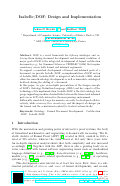Isabelle/DOF: Design and Implementation
Achim D. Brucker und Burkhart Wolff
 DOF is a novel framework for defining ontologies and enforcing them during document development and evolution. A major goal of DOF is the integrated development of formal certification documents (e. g., for Common Criteria or CENELEC 50128) that require consistency across both formal and informal arguments.
DOF is a novel framework for defining ontologies and enforcing them during document development and evolution. A major goal of DOF is the integrated development of formal certification documents (e. g., for Common Criteria or CENELEC 50128) that require consistency across both formal and informal arguments.
To support a consistent development of formal and informal parts of a document, we provide Isabelle/DOF, an implementation of DOF on top of the formal methods framework Isabelle/HOL. A particular emphasis is put on a deep integration into Isabelleas IDE, which allows for smooth ontology development as well as immediate ontological feedback during the editing of a document.
In this paper, we give an in-depth presentation of the design concepts of DOFas Ontology Definition Language (ODL) and key aspects of the technology of its implementation. Isabelle/DOF is the first ontology language supporting machine-checked links between the formal and informal parts in an LCF-style interactive theorem proving environment. Sufficiently annotated, large documents can easily be developed collabo- ratively, while ensuring their consistency, and the impact of changes (in the formal and the semi-formal content) is tracked automatically.
Schlüsselwörter: Ontology, Formal Document Development, Certification, DOF, Isabelle/DOF
Kategorien: ,
Dokumente: (Artikel als PDF Datei)
 Bitte zitieren sie diesen Artikel wie folgt:
Bitte zitieren sie diesen Artikel wie folgt:
Achim D. Brucker und Burkhart Wolff.
Isabelle/DOF: Design and Implementation.
In Software Engineering and Formal Methods (SEFM). Lecture Notes in Computer Science (11724), pages 275-292, Springer-Verlag, 2019.
Schlüsselwörter: Ontology, Formal Document Development, Certification, DOF, Isabelle/DOF
(Artikel als PDF Datei) (BibTeX) (Endnote) (RIS) (Word) (doi:10.1007/978-3-030-30446-1_15) (
 )
)
| abstract | = | {DOF is a novel framework for defining ontologies and enforcing them during document development and evolution. A major goal of DOF is the integrated development of formal certification documents (e. g., for Common Criteria or CENELEC 50128) that require consistency across both formal and informal arguments.\\\\To support a consistent development of formal and informal parts of a document, we provide Isabelle/DOF, an implementation of DOF on top of the formal methods framework Isabelle/HOL. A particular emphasis is put on a deep integration into Isabelle{\^a}s IDE, which allows for smooth ontology development as well as immediate ontological feedback during the editing of a document.\\\\In this paper, we give an in-depth presentation of the design concepts of DOF{\^a}s Ontology Definition Language (ODL) and key aspects of the technology of its implementation. Isabelle/DOF is the first ontology language supporting machine-checked links between the formal and informal parts in an LCF-style interactive theorem proving environment. Sufficiently annotated, large documents can easily be developed collabo- ratively, while ensuring their consistency, and the impact of changes (in the formal and the semi-formal content) is tracked automatically.}, | |
| address | = | {Heidelberg}, | |
| author | = | {Achim D. Brucker and Burkhart Wolff}, | |
| booktitle | = | {Software Engineering and Formal Methods (SEFM)}, | |
| doi | = | {10.1007/978-3-030-30446-1_15}, | |
| editor | = | {Peter C. {\"O}lveczky and Gwen Sala{\"u}n}, | |
| isbn | = | {3-540-25109-X}, | |
| keywords | = | {Ontology, Formal Document Development, Certification, DOF, Isabelle/DOF}, | |
| language | = | {USenglish}, | |
| location | = | {Oslo}, | |
| number | = | {11724}, | |
| pages | = | {275--292}, | |
| = | {https://www.brucker.ch/bibliography/download/2019/brucker.ea-isabelledof-2019.pdf}, | ||
| publisher | = | {Springer-Verlag}, | |
| series | = | {Lecture Notes in Computer Science}, | |
| title | = | {{Isabelle/DOF}: Design and Implementation}, | |
| url | = | {https://www.brucker.ch/bibliography/abstract/brucker.ea-isabelledof-2019}, | |
| year | = | {2019}, |

